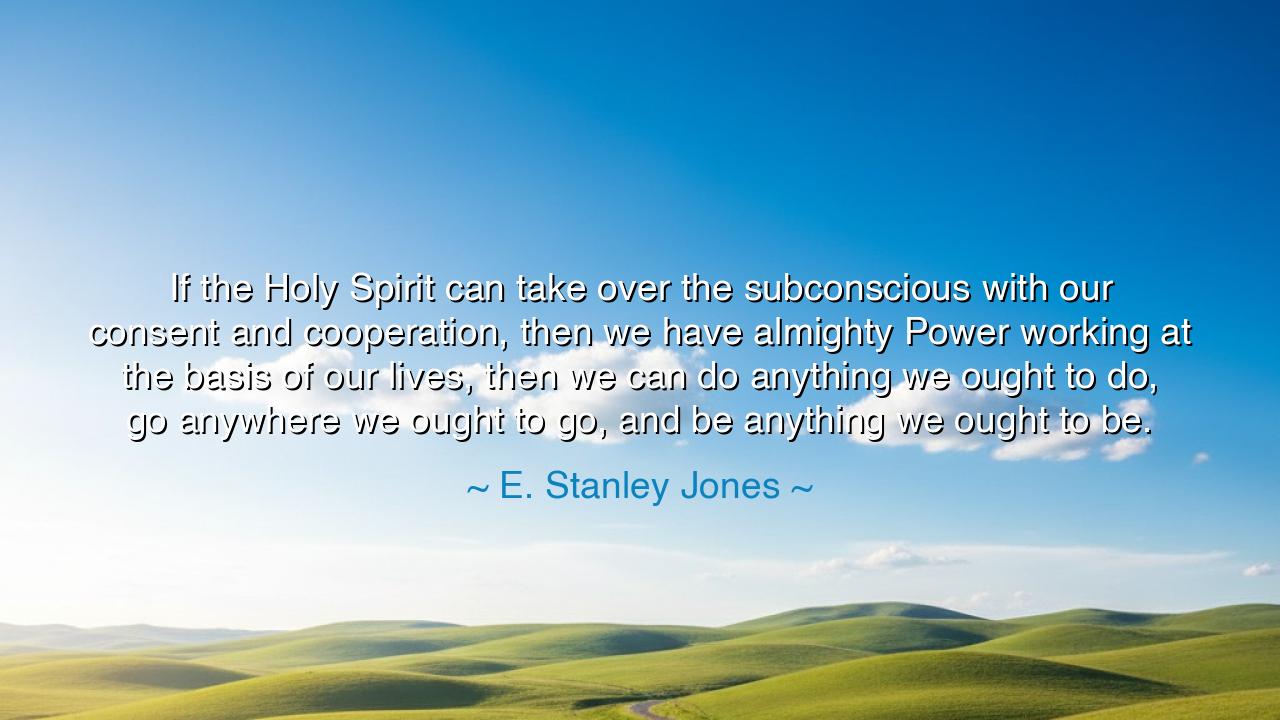
If the Holy Spirit can take over the subconscious with our
If the Holy Spirit can take over the subconscious with our consent and cooperation, then we have almighty Power working at the basis of our lives, then we can do anything we ought to do, go anywhere we ought to go, and be anything we ought to be.






E. Stanley Jones, missionary and herald of Christ’s kingdom, speaks with fire of the inner life: “If the Holy Spirit can take over the subconscious with our consent and cooperation, then we have almighty Power working at the basis of our lives, then we can do anything we ought to do, go anywhere we ought to go, and be anything we ought to be.” In this saying he reveals the mystery of divine indwelling—that when man surrenders not only his conscious thought but also his hidden depths, the Holy Spirit infuses him with limitless strength. What once was fragile becomes fortified; what once was weak becomes unbreakable, for the very Power of God has taken root at the foundation of the soul.
The ancients of faith knew this truth. The apostles, before Pentecost, were fearful, hesitant, uncertain. Yet when the Spirit descended upon them, filling even the hidden places of their being, they became bold preachers of truth, standing before emperors and mobs alike. Their courage was not their own, but the fruit of yielding their whole selves—conscious and subconscious—to the breath of God. Jones echoes this ancient miracle, showing that surrender is the door through which divine Power enters.
History bears testimony in the life of Joan of Arc. A simple peasant girl, untrained in war, she nevertheless rose to command armies and challenge kings. By her own strength she was nothing, but she consented and cooperated with the voice of heaven that stirred her depths. The Holy Spirit ruled her subconscious as well as her waking mind, and she became a vessel through which the impossible was made real. Her victories testify that when divine power forms the foundation of life, one can “do anything, go anywhere, and be anything” appointed by God.
Jones’s words also speak of the harmony between divine sovereignty and human freedom. The Spirit does not force Himself upon the soul; He seeks consent and cooperation. When man opens himself fully, allowing grace to permeate even the secret places of fear, memory, and instinct, then life becomes aligned with heaven’s will. The subconscious, once a source of hidden weakness, becomes a reservoir of divine strength.
Let the generations remember: when man unites with the Holy Spirit, not only in thought but in the deepest chambers of his being, he becomes more than conqueror. Fear dissolves, limitation fades, and the soul walks with the almighty Power of God beneath its steps. To resist is to remain bound; to yield is to be transformed. For with the Spirit at the foundation, man is no longer merely mortal—he is a vessel of eternity, able to fulfill all that he was meant to be.






PUNGUYEN HOAI PHUONG UYEN
This quote challenges me. It paints a picture of a life fully aligned with divine purpose, but it also raises questions about free will. If the Holy Spirit takes over the subconscious, do we risk losing individuality or personal agency? Or is it that true freedom comes only when we align ourselves completely with divine will? I’m curious how others reconcile faith with psychological autonomy in this sense.
DCNguyen Dinh Chuong
I can’t help but think about how this quote ties spirituality with psychology. If our subconscious truly drives our behavior, then letting a divine presence influence it could revolutionize personal transformation. But how would one know if that influence is authentic or just self-suggestion? Could this be interpreted as an early acknowledgment of the power of belief and intention over subconscious programming?
LCLuong CoCo
Reading this, I’m struck by the phrase ‘with our consent and cooperation.’ It implies a partnership between human will and divine influence. But what happens when our subconscious resists transformation—can the Holy Spirit still work through inner conflict and doubt? I’d like to know whether spiritual growth, in this context, depends more on surrender or active effort. How does one practically achieve that cooperation?
KLduong thi khanh linh
This idea feels profoundly empowering—having ‘almighty Power’ at work in our lives sounds almost miraculous. But I’m curious, does this concept exclude people who don’t share the same faith or understanding of the Holy Spirit? Could there be a more universal interpretation, perhaps as the alignment of our subconscious with higher moral principles or collective good rather than a strictly theological framework?
BTDao Bach Tung
I find this statement both inspiring and intimidating. It suggests limitless potential when aligned with divine will, but how do we discern what we ‘ought to do’ versus what we merely want to do? Is there a danger of misinterpreting personal desires as divine guidance? I’m curious how one maintains humility and discernment while believing they have such immense spiritual power available to them.